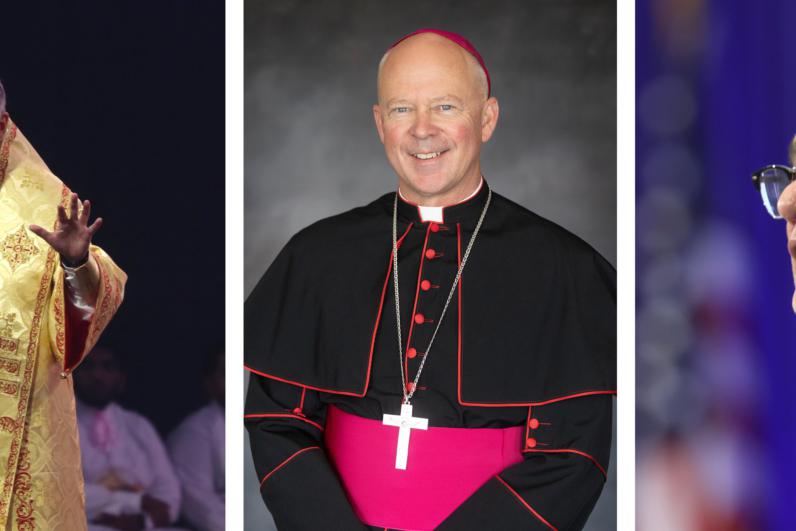Bishops assure transparency, urge 'seat at the table' for church in federal boarding school reckoning
(OSV News) -- As the nation continues to reckon with the legacy of residential boarding schools for Indigenous children, three U.S. Catholic bishops have urged the federal government to include in that process religious communities, which, along with the federal government, operated such institutions.
On July 30, Secretary of the Interior Deb Haaland announced the release of the second and final volume of the Federal Indian Boarding School Initiative's investigative report.
Haaland, a member of the Pueblo of Laguna and the first Native American to serve as a presidential Cabinet secretary, launched the comprehensive initiative in June 2021 to document the history and intergenerational impact of well over 400 schools, which from 1819 through the 1970s sought to forcibly assimilate thousands of Indigenous children -- many of whom also endured physical, psychological and sexual abuse in the process. At least 973 Indigenous children died while attending the schools, with at least 74 marked and unmarked burial sites at 65 different school locations, according to the report.
"This trauma is not new to Indigenous people," said Haaland in a July 30 video message posted to the Department of the Interior's Facebook page. "One of the reasons I launched the Federal Indian Boarding School Initiative was to ensure that this important story was told, that all of America knows of the intergenerational impacts of these policies and that we as a nation take steps to heal from them."
Bipartisan lawmakers in Congress -- drawing extensively on the findings of Haaland's initiative -- are also seeking to pass the Truth and Healing Commission on Indian Boarding Schools Policies Act of 2024, which would establish a federal commission for investigating the schools.
The Catholic Church supports such efforts and is actively seeking to participate in them, said Metropolitan Archbishop Borys A. Gudziak of the Ukrainian Catholic Archeparchy of Philadelphia, chairman of the U.S. Conference of Catholic Bishops' Committee on Domestic Justice and Human Development; Bishop Chad W. Zielinski of New Ulm, Minnesota, chairman of the USCCB's Subcommittee of Native American Affairs; and Auxiliary Bishop Arturo Cepeda of Detroit, chair of the USCCB's Committee on Cultural Diversity in the Church.
In July 25 letters addressed to Rep. Tom Cole, R-Okla., Rep. Sharice Davids, D-Kan., and Sen. Elizabeth Warren, D-Mass., the bishops said they wished "to state unequivocally that the tragic history of the Indian boarding school period should be brought to light in order to pave the way for healing of impacted Indigenous communities.
"Our guiding principle, as the Church, is truth," they wrote, citing a verse from the Gospel of John: "You will know the truth, and the truth will set you free" (Jn 8:32).
The bishops pointed to the USCCB's recently adopted guidelines for Indigenous ministry, which "recognized that Native boarding schools are a significant source of trauma in the history of Indigenous peoples, especially because of their profound effect on the family."
The document, titled "Keeping Christ’s Sacred Promise: A Pastoral Framework for Indigenous Ministry," also "acknowledged that the Church played a part in trauma experienced by Native children," said the bishops in their letters to Congress.
They also offered "two points" to help "prompt further thinking and discussion around the structure of the legislation" -- a request for representation on the commission, and a concern regarding the "broad subpoena power" of the legislation.
The current drafting of the legislation, which stipulates participation by federal agencies and various Indigenous associations, does not include a place for "the religious communities that have historic ties to the schools," wrote the bishops.
Noting that the federal government was largely responsible for the schools' policies and funding, with approximately half run in partnership with Catholic and Protestant entities, the bishops stressed that "participation by present-day representatives of religious communities could help better facilitate requests for records or dialogue with current leaders of those communities," who "could serve as an important liaison for voluntary cooperation" with the commission.
"It seems like an omission if the government, which was the genesis of the boarding schools, has a 'seat at the table,' but religious communities do not," the bishops wrote. "Healing and reconciliation are only possible if all parties are involved."
Regarding the legislation's subpoena power, the bishops stressed that in 2021, following Haaland's announcement of the Federal Indian Boarding School Initiative, all U.S. bishops were encouraged to practice "transparency in bringing forward this history and to engage in meaningful dialogue with affected communities."
That request was made in a Nov. 8 letter by Archbishop Paul S. Coakley of Oklahoma City and Bishop James S. Wall of Gallup, New Mexico, who advised their brother bishops, “If the government asks for any records you may possess, we encourage cooperation.”
In their July 25 letters, Archbishop Gudziak, Bishop Zielinski and Bishop Cepeda said they were "not aware of any requests for relevant records that have been denied," and that there were "several examples of voluntary disclosures of historical records."
At the same time, they said, "It is possible that some school records could contain information that could be subject to restrictions of federal law. Moreover, the disclosure of the Church’s sacramental records is governed by canon law."
However, "if there are … denials (of such requests), please bring them to our attention," wrote the bishops, adding, "we will endeavor to connect with the appropriate record-holders and facilitate a possible solution," since "the preferred way of proceeding is to request voluntary cooperation first, and only resort to a subpoena if voluntary efforts fail."
"We are committed to transparency, to listening, and to humility in prayerfully walking together on this difficult path, and we stand ready to work with you on efforts to bring the truth forward towards that end of healing and reconciliation," they wrote.
- - - Gina Christian is a multimedia reporter for OSV News. Follow her on X (formerly Twitter) @GinaJesseReina.



















